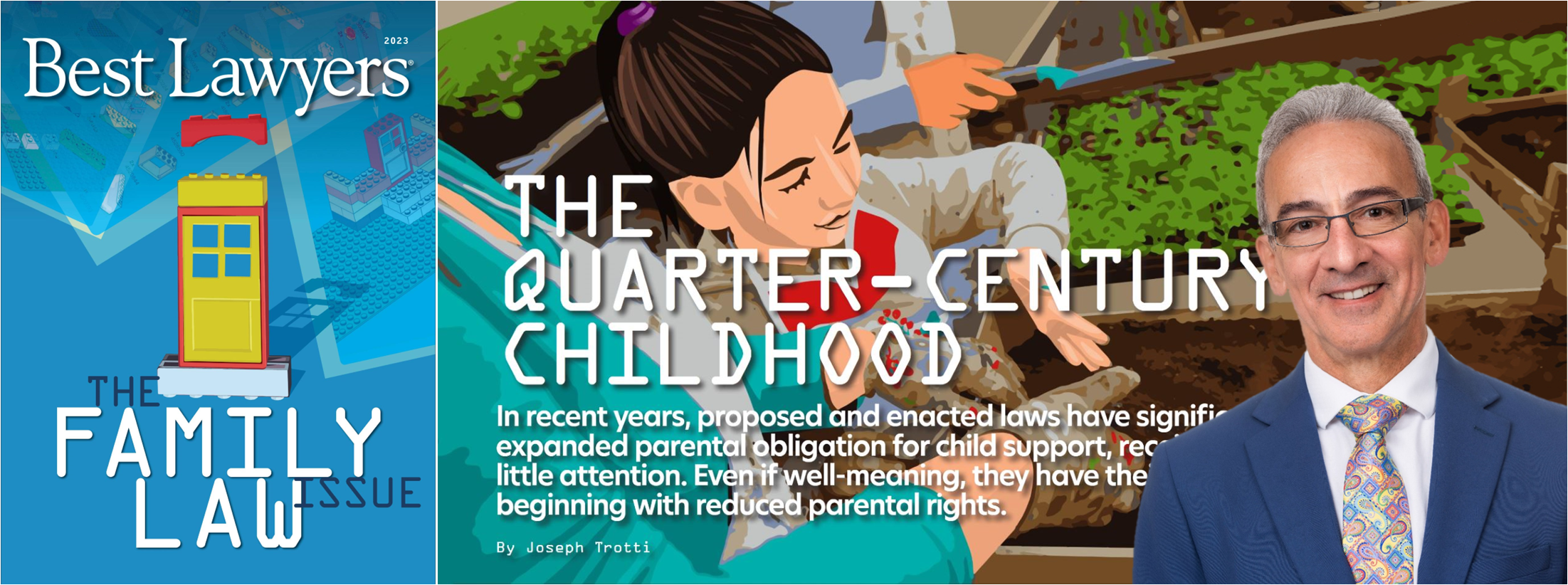
VMM partner Joseph Trotti published an article today in Best Lawyers: The Family Law Issue 2023.
The peer-reviewed and edited publication features "the top legal talent practicing in Family Law" explaining in simple language the current trends and challenges of the field.
Mr. Trotti's article, "The Quarter-Century Childhood," discusses the recent laws significantly expanding parental obligation for child support which have received oddly little attention. It can be found online here, in print on pgs. 31–33 here, and below.
This is the second consecutive year Mr. Trotti was asked to contribute to the prestigious publication. His 2022 article, "Crossing the Line," about the complexity of divorce and custody matters across state lines, can be found here.
This follows several articles Mr. Trotti published in recent months, notably "In family law, don’t focus; use a wide-angle lens" in the American Bar Association Journal; "She-Hulk: Attorney at Law Is a Preposterous Legal Show" in Attorney at Law Magazine; and "Roe v. Wade overturned – what it means for New Yorkers" in AM New York.
Additionally, Mr. Trotti is named to The Best Lawyers in America 2023, a peer-reviewed directory published by Best Lawyers.
The Quarter-Century Childhood
In recent years, proposed and enacted laws have significantly expanded parental obligation for child support, receiving little attention. Even if well-meaning, they have their flaws, beginning with reduced parental rights.
Joseph Trotti
December 19, 2022
Child support is traditionally thought of as beginning at a child’s birth and ending at adulthood, or the “age of majority,” which is between 18 and 21, depending on the state. This is the one constant unaffected by years of court mandates and legislative changes. Through a succession of recent bills, though, both passed and pending (and, oddly enough, initiated by both sides of the political aisle), the legal definition of parental obligation for paying child support has been significantly expanding.
The Affordable Care Act (ACA, also known as Obamacare), which took effect May 10, 2010, allows young adults to stay on their parents’ health care plan until age 26. The purpose is to make health insurance available to as many people as possible—a commendable aim. In general, but particularly in poorer families, adults between 21 and 26 are less likely than their parents to have a higher education, have a job that offers health benefits or be financially independent. The pandemic also kept many at home, forced them back home or simply deprived them of stable income, resulting in a sharp increase in adult dependents under the ACA.
The ACA also covers adult dependents who are themselves married or have children. In cases involving child support, custodial parents in states with ACA Medicaid expansion both receive more child support and have seen proportionately larger payment increases than those in non-expansion states.
For custodial parents struggling financially, child support is often a substantial source of money—for some as much as 60% of their annual income. At the same time, support often goes unpaid due to the other parent’s financial hardship. In fact, just 43% of custodial parents with child support agreements, across the U.S. and the socioeconomic spectrum, receive their payments in full. Legal penalties for nonpayment—revocation of driver’s license, asset seizure, withholding unemployment compensation or other government payments, even imprisonment—as understandable and justified as they might be, do little to remedy the situation.
Increased access to health insurance has been shown conclusively to result in less debt and fewer evictions and bankruptcies. (Nearly 70% of bankruptcies in the U.S. are tied to medical issues, even after the implementation of the ACA, due either to the high cost of care or time off work, making it the primary cause of bankruptcy by some margin.)
It’s hard to argue with all this, but one potentially negative effect of the ACA is that parents are now often responsible for their child’s health care for five additional years. This adds another set of considerations and even limitations to parents’ own independence and well-being: The extended period of child dependency could mean for some a delay in retirement, investment in one’s home or pursuit of hard-earned leisure.
It’s unclear why age 26 was chosen as the ACA threshold, but it likely served as the benchmark for New York State Assembly Bill A00898B, signed into law on October 8, 2021. The law added a new section to New York’s Domestic Relations Law and Family Court Act, by which a parent who would otherwise be chargeable with the support of a minor child is also chargeable with the support of an adult child, up to age 26, if the child is developmentally disabled (as deemed by the court).
New York, where I practice, was behind most states on the matter, many of which already have similar laws mandating parental support of children with developmental, mental, physical and other special needs that prevent them from adequately caring for themselves. The age limit varies; in California, for example, parents are required to provide financial support indefinitely. The new law in New York also grants courts discretion in determining the level of support beyond what’s provided for in the Family Court Act, which uses a fixed percentage of both parents’ incomes.
The law is meant to help custodial parents of developmentally disabled adult children who do not receive enough support from the other parent to properly care for them. (Interestingly, it remains a matter of debate whether divorce rates are higher for families with special-needs children, though it seems they likely aren’t.)
It’s unquestionably laudable, but the law’s language leaves a lot to interpretation, and it remains to be seen how the courts (which have wide discretion in determining whether a child meets the disability criteria and the extent of support they require) will rule once cases appear before them. For example, the law requires the custodial parent seeking to extend or expand support payments to demonstrate that the financial responsibility of caring for the child has been “unreasonably placed” on them. How exactly can they demonstrate this? How might the other parent rebut the claim? What are the criteria by which the court determines the eligibility of the disabled child and the commensurate financial responsibility? How will these decisions be implemented? These and other questions will need to be resolved, whether by courts or the legislature. In the meantime, there’s plenty of room for contentious litigation.
Finally, there’s the Unborn Child Support Act, a pending bill introduced on July 13, 2022, in both the U.S. House and Senate. It seeks to amend the Social Security Act to give mothers the ability to receive child support payments while they’re pregnant (including retroactively to the point of conception, as determined by a physician).
While this proposed law is obviously meant to advance a political agenda—spurred by the Dobbs v. Jackson decision of June 2022, which overturned Roe v. Wade—and motivated by the belief that life begins at conception and that expectant mothers receiving support would be less likely to abort, we should judge its merits and faults objectively.
Paternal financial responsibility for pregnancy-related care, for both the mother and the fetus, makes economic sense. But the notion of the fetus’s “personhood” and the legal obligation for its rights rather than those of either parent raise important questions. Does this cover doctor’s appointments, tests, medicines and other related expenses? What about transportation to and from a doctor’s office? Or maternity clothing?
Child support and parental rights usually go hand in hand, but what all three laws have in common is an expanded parental obligation without a corresponding increase in rights. A parent may find him- or herself paying for years of care while having no say in the child’s life, or even access to the child. There is real risk that these laws would be abused in bad faith by parents motivated more by avarice or reprisal than the child’s best interests and needs.
None of this is solely to list the pros and cons of each law or render judgment. Rather, it’s to point out the incremental but accumulatively substantial accretion—which has gone largely unnoticed, like the experience of the proverbial frog in hot water—of what the law considers a “child” for the purposes of child support, and to highlight the potential legal, economic and psychological ramifications of this new reality.
Joseph Trotti is the head partner of Vishnick McGovern Milizio LLP’s Matrimonial and Family Law Practice and founder of the VMM Family InstituteSM. He leads VMM’s Litigation Department and is a key member of the firm’s Surrogacy, Adoption and Assisted Reproduction and LGBTQ Representation practices. He can be reached at jtrotti@vmmlegal.com and 516.437.4385.



